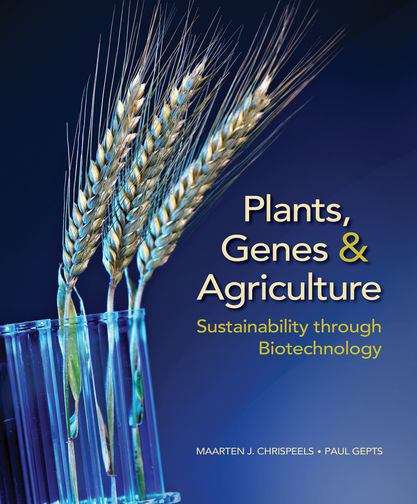Plants, Genes, and Agriculture: Plants, Genes, and Agriculture
By: and
Sign Up Now!
Already a Member? Log In
You must be logged into Bookshare to access this title.
Learn about membership options,
or view our freely available titles.
- Synopsis
-
What needs to happen if we are going to feed almost 10 billion people by the year 2050 in a sustainable way? Written for first- and second-year university students, this interdisciplinary textbook addresses this challenging question, presenting biological, economic, and sociocultural issues at an introductory level.
Presenting and integrating information from many disciplines, this book invites readers to consider the complexity of feeding humanity and increasing food production sustainably.
Topics covered include:
- the development, physiology, and nutrition of plants
- human nutrition and food safety
- photosynthesis and energy transformations
- genetics, molecular biology, and genomics, including the techniques of genetic transformation (gene silencing, gene editing with CRISPR) used in modern crop breeding
- crop domestication and plant breeding
- soil ecosystems
- the biotic (animal pests, diseases, and weeds) and abiotic (drought, flooding, temperature extremes, and soil degradation) stresses that limit crop production
- technological advances and how new innovations (equipment, chemical products, and improved plant varieties) reach farmers and eventually affect what we eat; also discusses legal aspects (e.g., patents) relevant to agricultural innovations
- plants as sources of pharmaceuticals and specialty chemicals
Although publicized in the controversies surrounding "genetically modified organisms" (GMOs), the applications of modern biotechnology to agriculture extend far beyond GMOs, and include crop improvements that rely on knowledge of the plant's genomes and its analysis by bioinformatics. This unifying theme of the text is stressed in coverage of a number of issues that appear throughout the chapters, including:
- how crop plant breeders look for specific traits to solve practical problems
- genetic engineering of crops as a useful way to supplement conventional plant breeding
- the nature of agribusiness in industrialized countries
- the vital contributions of developing countries and their smallhold farmers, and the unique challenges facing them
Challenging and controversial topics such as the safety of pesticides and GMOs, the increasing demand for animal products and the stresses this puts on agricultural output, organic farming and foods, and patenting new crop varieties are dealt with in a balanced way, inviting teachers and students to consider all the implications of these serious questions.
- Copyright:
- 2018
Book Details
- Book Quality:
- Excellent
- ISBN-13:
- 9781605356846
- Publisher:
- Oxford University Press
- Date of Addition:
- 12/26/18
- Copyrighted By:
- Oxford University Press
- Adult content:
- No
- Language:
- English
- Has Image Descriptions:
- No
- Categories:
- Nonfiction, Textbooks, Earth Sciences
- Submitted By:
- Daproim Africa
- Proofread By:
- Daproim Africa
- Usage Restrictions:
- This is a copyrighted book.
Reviews
Other Books
- by Maarten Chrispeels
- by Paul Gepts
- in Nonfiction
- in Textbooks
- in Earth Sciences
